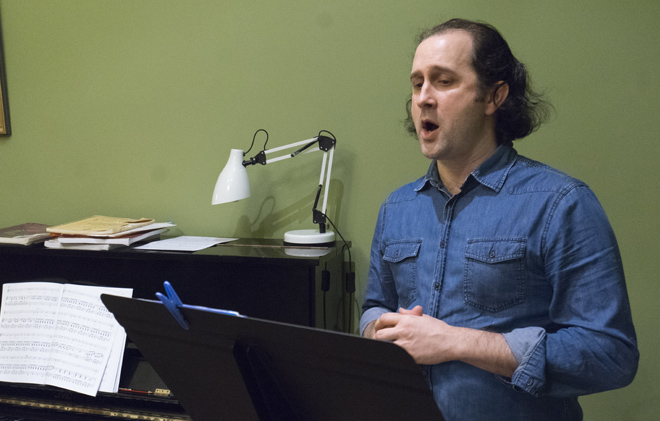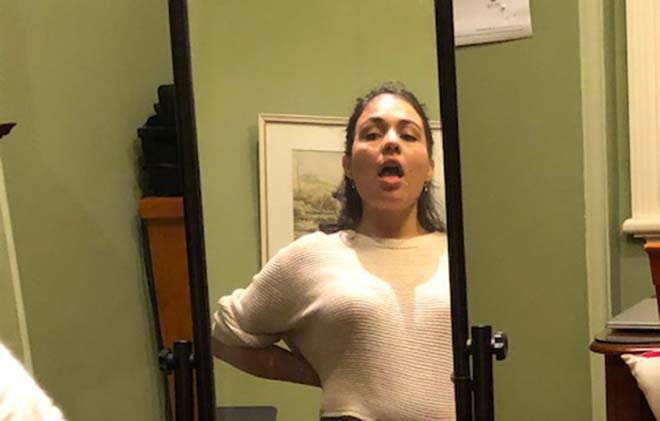Warm Up To Singing Exercises – For A Stronger Voice
Recently a singer told me they didn’t like the scales, arpeggios and exercises we do at the beginning of lessons, because they were worried about getting them wrong. Well, getting them ‘wrong’ is part of the learning process!
Singers may be dismissive of exercises, try to avoid them, or feel that singing a song is enough. As a singing teacher, part of my job is explaining why exercises are useful. Your job as a singer is to bring your awareness, concentration and thinking to the task of exercises, so you can notice changes in your voice as you improve. Without spending time on exercises and warm-ups, your voice will be at base camp for a long while.
 WHY ARE SINGING EXERCISES IMPORTANT?
WHY ARE SINGING EXERCISES IMPORTANT?
Vocal exercises work your brain, body and voice together. They develop neural pathways in your brain that increase your vocal ability. With practice, your singing becomes efficient and aligned to your body and breath. You learn to shape your vocal tract (the ‘tube’ from your lips to your larynx) for vowels, consonants and volume, and to make sounds we recognise as words. Singing exercises extend your register higher and lower, and improve your pitch accuracy, use of staccato and legato, among many other musical devices.
Think of a voice warm-up like a physical warm-up for athletes: you’re both paying attention to coordination, efficiency and strengthening your ability. Voice exercises, in particular, raise awareness of how you use your abdominal muscles for breathing and breath control. Gradually, this skill becomes an effortless part of your singing.
Once you have the technical skills that exercises bring, you can be creative in your songs and performance. Without their foundation though, while you can still perform, you can’t understand or control how your body responds. Nuanced communication will be missing. Singing exercises, warm-ups and vocalise allow you to add different colours, dynamics and expression to words and sounds.
It’s best to start relatively easy and increase in strenuousness, speed and range as your singing skills develop. Set specific goals for safely exploring vocal exercises to build mastery and develop reliable vocal feedback. Notice your body’s feedback when you achieve things like accurate pitching, precise intervals, the shape of phrases and an understanding of how your body mechanisms, and its specific physical coordinations, work as you sing.
The first sign of learning is confusion, so if you attempt exercises and they sound ‘off’ that’s fine, because in the early stages you are just taking ‘target practice’, as I call it. This can include breathing exercises, as well as vocal warm-ups and exercises. With focused practice, your new skills will become permanent.
Here are some exercises to try:
- On a sigh sound, say: “Oh my, oh my, oh my, oh my”, gliding from the upper parts of your voice down to the lower register. Do this several times.
This easy warm-up will help you understand the movement of your tongue and how resonance is changed:
- Sing a gentle ‘ee’ on a comfortable pitch. Notice where your tongue and mouth lie for this vowel. You don’t need a ‘wide smile’ mouth shape for this. Again, notice where you tongue is as you sustain the note. Repeat several times.
- Then as you sustain ‘ee’, move your tongue to an ‘ah’ vowel. Try it a few times.
- What happens if you move your tongue back too far? There is a bottled-up sound, as your tongue covers the space where air is flowing and recognisable sound is formed.
- Now try the same again and this time as you go from ‘ee’, to ‘ah’, allow your tongue to find an optimal ‘ah’ without the tone being distorted.
- Your brain is learning how to move your tongue for vowels by using a forward and back action. With practice, you’ll find an optimal sound for both vowels.
 Try these tongue twisters:
Try these tongue twisters:
Sing word combinations like ‘Yellow leather-red leather’ or ‘Wallawallawashington’ on descending arpeggios. This is great for practising tongue movement, especially at speed. It helps you coordinate shapes, positions and moves using your articulators.
Can you use songs or parts of songs as exercises?
Yes. You can use a song you’re working on as a starter for a group of exercises. Vocalise exercises can also help you learn musical patterns, devices and an array of skills by singing on vowels, without the distraction of words, sentences and trying to understand meaning.
HOW LONG DO YOU WARM UP AND SING EXERCISES FOR?
It depends on several factors, including your age, skill development and available time.
I usually suggest beginner singers start with 10-15 minutes daily or every other day. You may need to set a goal to devote a certain time in your day until the habit settles into your daily routine. Advanced singers will spend up to 30 minutes on exercises before looking at songs. Some days you may only sing exercises and other days exercises may be only 5-10 minutes and you use parts of songs to develop singing skills.
The key is to focus on the specific skill you have been working on in lessons. Is that opening your throat, relaxing your jaw or opening your ribs? Use the exercises to concentrate on those skills. Skills will build and you will begin to notice a difference.
By doing exercises, warm-ups and vocalise, you develop an awareness of the sounds you make, the vibrations in your vocal tract, in your head and bones, and your mouth and face. Your acoustic knowledge of your voice becomes automatic. Over time, your identity as a singer develops, in part, due to your ability to rely on these technical skills, so you become a confident, stable and fearless performer.
Learn to love vocal exercises and become a better singer. To find out how Kathleen Connell can help you reach your singing goals, get in touch.




